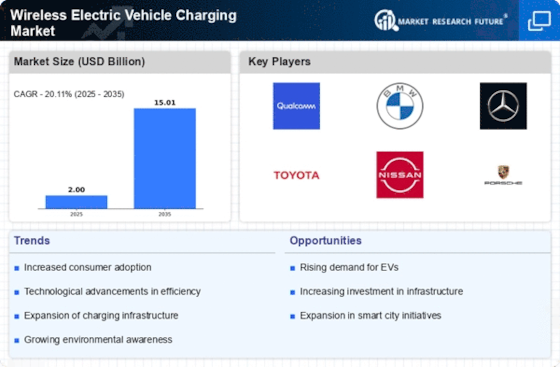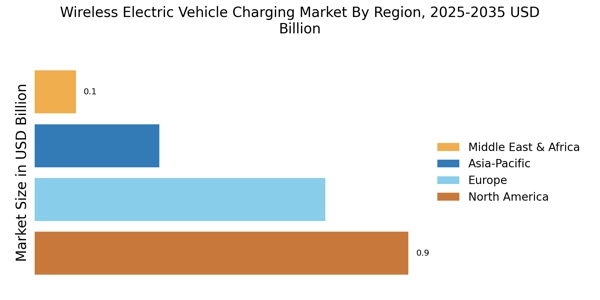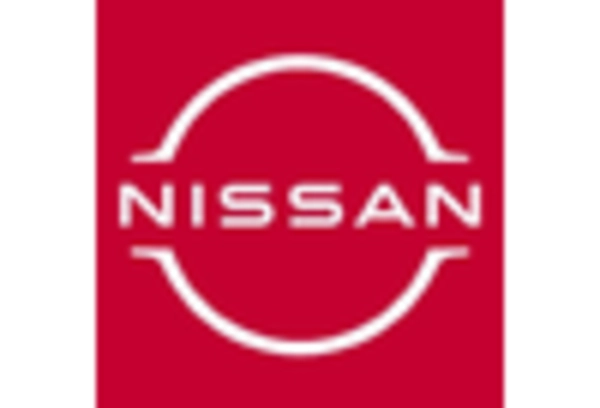Rising Environmental Concerns
The Wireless Electric Vehicle Charging Market is significantly influenced by rising environmental concerns among consumers and policymakers alike. As awareness of climate change and air pollution grows, there is an increasing demand for sustainable transportation solutions. Electric vehicles, particularly those utilizing wireless charging technology, are viewed as a cleaner alternative to fossil fuel-powered vehicles. The market is projected to grow as more consumers seek eco-friendly options, with estimates suggesting that the electric vehicle market could reach over 30 million units by 2030. This shift towards sustainability is likely to drive investments in wireless charging infrastructure, as stakeholders recognize the potential for reducing greenhouse gas emissions and promoting cleaner urban environments.
Consumer Demand for Convenience
Consumer demand for convenience is a driving force behind the Wireless Electric Vehicle Charging Market. As electric vehicle ownership rises, users are increasingly seeking hassle-free charging solutions that fit seamlessly into their lifestyles. Wireless charging technology offers the advantage of eliminating the need for physical connections, allowing vehicles to charge automatically while parked. This convenience is particularly appealing in urban environments where space is limited. Market Research Future indicates that a significant percentage of consumers prioritize ease of use when selecting charging options. As manufacturers respond to this demand by developing more user-friendly wireless charging systems, the market is likely to expand. The trend towards convenience in charging solutions is expected to play a crucial role in the future growth of the industry.
Government Policies and Incentives
Government policies play a pivotal role in shaping the Wireless Electric Vehicle Charging Market. Various countries are implementing incentives to promote electric vehicle adoption, which indirectly boosts the demand for wireless charging solutions. For example, tax rebates, grants, and subsidies for electric vehicle purchases are becoming commonplace, encouraging consumers to transition from traditional vehicles. Additionally, regulatory frameworks are being established to support the deployment of charging infrastructure, including wireless options. As governments set ambitious targets for reducing carbon emissions, the push for electric vehicles and their associated charging technologies is expected to intensify. This supportive environment is likely to foster innovation and investment in the wireless charging sector.
Increased Investment in Infrastructure
Investment in charging infrastructure is a critical driver for the Wireless Electric Vehicle Charging Market. As electric vehicle adoption accelerates, the need for robust charging networks becomes increasingly apparent. Public and private sectors are channeling funds into the development of wireless charging stations, which offer convenience and efficiency. Reports indicate that investments in charging infrastructure could exceed several billion dollars in the coming years, reflecting a commitment to enhancing the user experience. This influx of capital is likely to facilitate the deployment of advanced wireless charging technologies, making them more accessible to consumers. The establishment of widespread charging networks is essential for alleviating range anxiety and promoting the broader acceptance of electric vehicles.
Technological Innovations in Charging Solutions
The Wireless Electric Vehicle Charging Market is experiencing a surge in technological innovations that enhance charging efficiency and convenience. Recent advancements in resonant inductive charging technology have led to systems that can deliver power wirelessly with minimal energy loss. For instance, systems capable of charging vehicles at rates exceeding 20 kW are becoming more prevalent, which could significantly reduce charging times. Furthermore, the integration of smart grid technology allows for optimized energy distribution, potentially lowering costs for consumers. As these technologies mature, they are likely to attract more manufacturers and consumers, thereby expanding the market. The increasing focus on developing high-efficiency charging pads and vehicles equipped with compatible receivers indicates a promising trajectory for the industry.

















